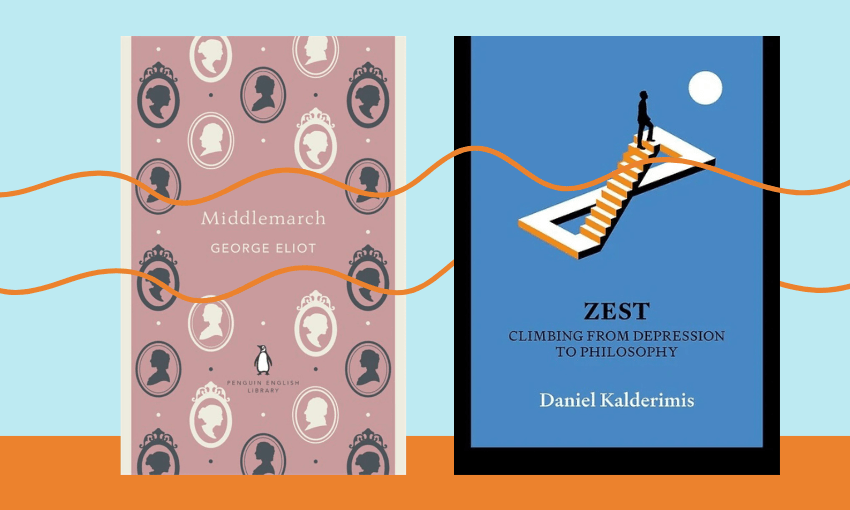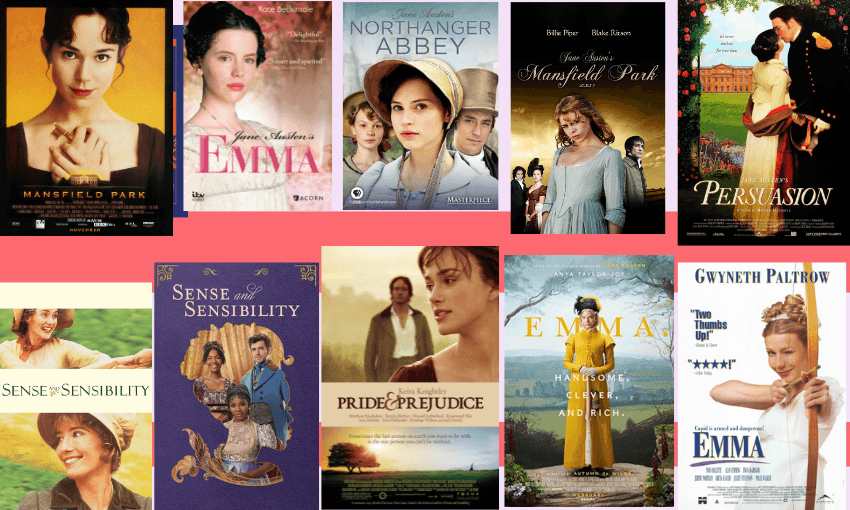Heidi Thomson on how her husband’s illness and Daniel Kalderimis’s book Zest have enhanced her understanding of George Eliot’s great novel.
Sometimes a book finds you at just the right time. In early December my husband John had a stroke. At the time we were both reading George Eliot’s Middlemarch, so I read Middlemarch to him in the hospital. We embarked on Adam Bede in the hospital as well, and now, at home, I am reading Daniel Deronda to him.
A stroke is a life-changing event for both patient and caregiver. It completely resets the parameters of your life and shrinks the boundaries of activities to the immediate home. It deprives both of you of a decent night’s sleep, transforms taking a shower into a mammoth undertaking, and turns getting to a doctor’s appointment into a strategic travel planning exercise. It dulls creativity and reduces thought to figuring out a trip to the pharmacy. It makes listening to people’s holiday accounts a tad trying.
And then there is the loneliness, despite being joined at the hip 24/7. At times it is just too hard to connect because of impeded speech and cognition, of having to concentrate so hard on eating a meal that having a conversation at the same time is an impossible effort. The complete recalibration in my life of what constitutes a “good day” made me realise that the novels of George Eliot (1819–1880) have been the perfect source of consolation. Eliot’s compassionate, cogent, humane take on life in all its imperfections has been helping me put things in perspective on a continuum that resists binary pigeonholing of what works and what doesn’t work.
My own awareness of Eliot’s healing power coincided with coming across Daniel Kalderimis’s recently published Zest: Climbing from Depression to Philosophy. In this book Kalderimis charts his recovery from perfectionist functionalism, misguided self-interest and depression to a way of living that purposefully focuses more on acceptance, responsive awareness, continuity and loving connection.
“You’d like this book,” my son told me. “He goes on about George Eliot.” Reading Zest gave me enormous pleasure, because Kalderimis articulated what my exhausted brain surmised but could not express. What George Eliot gives to Kalderimis and me are the tenets of a moral philosophy through the intricate canvas of a community, populated with ordinary characters who flounder and fail, who try and sometimes succeed, who are forced to make do with the reality they are in. As Kalderimis puts it, Eliot “reminds us not to romanticise the nature of human choice”. I am reminded of the relevance of T. S. Eliot’s line in The Cocktail Party: “the best of a bad job is all any of us make of it”. And that’s not a bad thing.
George Eliot is not the only star of Kalderimis’s book. Martha Nussbaum, whose work on “virtue ethics” he admires, and Iris Murdoch, whose focus on “imaginative attention” is key, complete his philosophical trinity. Many other writers, artists, philosophers are invoked for their thoughts: Charles Taylor, Dr Seuss, Lauris Edmond, Jonathan Haidt, Viktor Frankle, Primo Levi, Billy Joel, Leo Tolstoy, Leonard Cohen, Baruch Spinoza – the list goes on. Part of the beauty of this book is its informed eclecticism, blending psychology and philosophy. Kalderimis is confident enough not to jump on any particular bandwagon; instead he develops a compass to navigate by, gleaning from existentialism, modern Stoicism and western Buddhism.
Kalderimis’s aim is to develop a self-awareness that goes beyond narrow self-interest, embracing imperfection and interactions with a spirit of generosity. “I often felt like I was talking with an IT consultant about a malfunctioning laptop”, he writes about therapy, and decides that he could aim for something more durable. While therapy definitely matters, he also wants to figure out how to live rather than how to fix something.
Ironically, what made Kalderimis so successful in his professional life as a litigation lawyer, had also become (thinking of Coleridge’s brilliant poem Dejection: An Ode here) “the habit of his soul”, to his detriment. The need to fixate on binary solutions (right / wrong; evidence / not evidence) in decision making as a professional ends up permeating one’s whole life, thereby obscuring the complexity and continuum of life itself.
In chapter seven of his book, Kalderimis talks about the enhanced connection with joy through getting “very old or very ill”. Over the last four months John stopped breathing suddenly, without any discernible trigger, twice. On both occasions we managed to resuscitate him with the assistance of the 111 operator, but we have no idea if, or when, this will happen again. To be or not to be is not a philosophical question at that moment.
Living with the immanence of mortality is not easy, but it makes the homegrown tomatoes taste more of the sun, it lights up the day-glo gerberas on the terrace even more, it enhances the flavour of a meal brought over by good friends, and it allows us to make more sense of great novels.
Zest by Daniel Kalderimis ($40) is available to purchase at Unity Books; as is Middlemarch by George Eliot in multiple editions.


